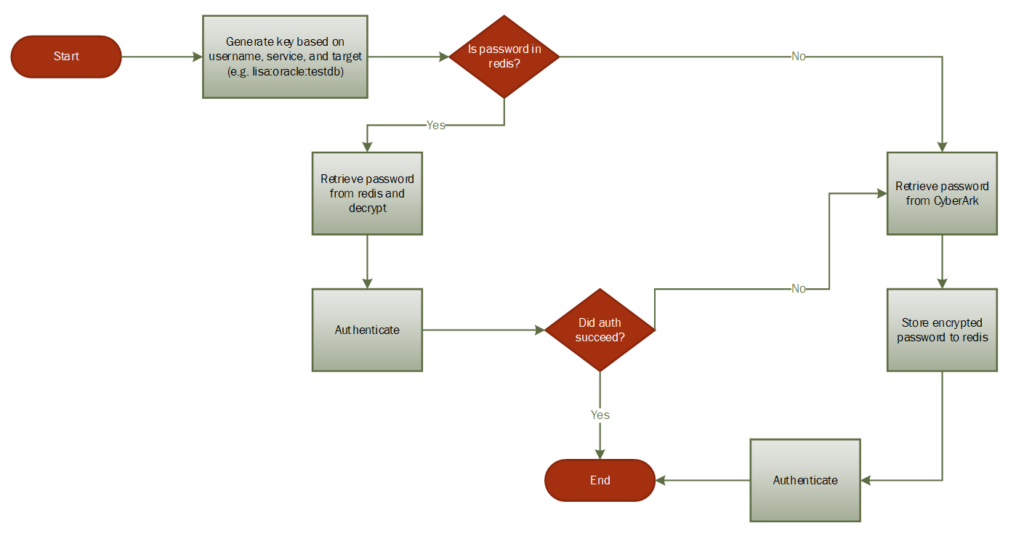Issue: The multi-step process of retrieving credentials from CyberArk introduce noticeable latency on web tools that utilize multiple passwords. This occurs each execution cycle (scheduled task or user access).
Proposal: We will use a redis server to cache credentials retrieved from CyberArk. This will allow quick access of frequently used passwords and reduce latency when multiple users access a tool.
Details:
A redis server will be installed on both the production and development web servers. The redis implementation will be bound to localhost, and communication with the server will be encrypted using the same SSL certificate used on the web server.
Data stored in redis will be encrypted using libsodium. The key and nonce will be stored in a file on the application server.
All password retrievals will follow this basic process:
Outstanding questions:
- Using a namespace for the username key increases storage requirement. We could, instead, use allocate individual ‘databases’ for specific services. I.E. use database 1 for all Oracle passwords, use database 2 for all FTP passwords, use database 3 for all web service passwords. This would reduce the length of the key string.
- Data retention. How long should cached data live? There’s a memory limit, and I elected to use a least frequently used algorithm to prune data if that limit is reached. That means a record that’s fused once an hour ago may well age out before a frequently used cred that’s been on the server for a few hours. There’s also a FIFO pruning, but I think we will have a handful of really frequently used credentials that we want to keep around as much as possible.Basically infinite retention with low memory allocation – we could significantly limit the amount of memory that can be used to store credentials and have a high (week? weeks?) expiry period on cached data.Or we could have the cache expire more quickly – a day? A few hours? The biggest drawback I see with a long expiry period is that we’re retaining bad data for some time after a password is changed. I conceptualized a process where we’d want to handle authentication failure by getting the password directly from CyberArk and update the redis cache – which minimizes the risk of keeping the cached data for a long time.
- How do we want to encrypt/decrypt stashed data? I used libsodium because it’s something I used before (and it’s simple) – does anyone have a particular fav method?
- Anyone have an opinion on SSL session caching
################################## MODULES ##################################### # No additional modules are loaded ################################## NETWORK ##################################### # My web server is on a different host, so I needed to bind to the public # network interface. I think we'd *want* to bind to localhost in our # use case. # bind 127.0.0.1 # Similarly, I think we'd want 'yes' here protected-mode no # Might want to use 0 to disable listening on the unsecure port port 6379 tcp-backlog 511 timeout 10 tcp-keepalive 300 ################################# TLS/SSL ##################################### tls-port 6380 tls-cert-file /opt/redis/ssl/memcache.pem tls-key-file /opt/redis/ssl/memcache.key tls-ca-cert-dir /opt/redis/ssl/ca # I am not auth'ing clients for simplicity tls-auth-clients no tls-auth-clients optional tls-protocols "TLSv1.2 TLSv1.3" tls-prefer-server-ciphers yes tls-session-caching no # These would only be set if we were setting up replication / clustering # tls-replication yes # tls-cluster yes ################################# GENERAL ##################################### # This is for docker, we may want to use something like systemd here. daemonize no supervised no #loglevel debug loglevel notice logfile "/var/log/redis.log" syslog-enabled yes syslog-ident redis syslog-facility local0 # 1 might be sufficient -- we *could* partition different apps into different databases # But I'm thinking, if our keys are basically "user:target:service" ... then report_user:RADD:Oracle # from any web tool would be the same cred. In which case, one database suffices. databases 3 ################################ SNAPSHOTTING ################################ save 900 1 save 300 10 save 60 10000 stop-writes-on-bgsave-error yes rdbcompression yes rdbchecksum yes dbfilename dump.rdb # dir ./ ################################## SECURITY ################################### # I wasn't setting up any sort of authentication and just using the facts that # (1) you are on localhost and # (2) you have the key to decrypt the stuff we stash # to mean you are authorized. ############################## MEMORY MANAGEMENT ################################ # This is what to evict from the dataset when memory is maxed maxmemory-policy volatile-lfu ############################# LAZY FREEING #################################### lazyfree-lazy-eviction no lazyfree-lazy-expire no lazyfree-lazy-server-del no replica-lazy-flush no lazyfree-lazy-user-del no ############################ KERNEL OOM CONTROL ############################## oom-score-adj no ############################## APPEND ONLY MODE ############################### appendonly no appendfsync everysec no-appendfsync-on-rewrite no auto-aof-rewrite-percentage 100 auto-aof-rewrite-min-size 64mb aof-load-truncated yes aof-use-rdb-preamble yes ############################### ADVANCED CONFIG ############################### hash-max-ziplist-entries 512 hash-max-ziplist-value 64 list-max-ziplist-size -2 list-compress-depth 0 set-max-intset-entries 512 zset-max-ziplist-entries 128 zset-max-ziplist-value 64 hll-sparse-max-bytes 3000 stream-node-max-bytes 4096 stream-node-max-entries 100 activerehashing yes client-output-buffer-limit normal 0 0 0 client-output-buffer-limit replica 256mb 64mb 60 client-output-buffer-limit pubsub 32mb 8mb 60 dynamic-hz yes aof-rewrite-incremental-fsync yes rdb-save-incremental-fsync yes ########################### ACTIVE DEFRAGMENTATION ####################### # Enabled active defragmentation activedefrag no # Minimum amount of fragmentation waste to start active defrag active-defrag-ignore-bytes 100mb # Minimum percentage of fragmentation to start active defrag active-defrag-threshold-lower 10
